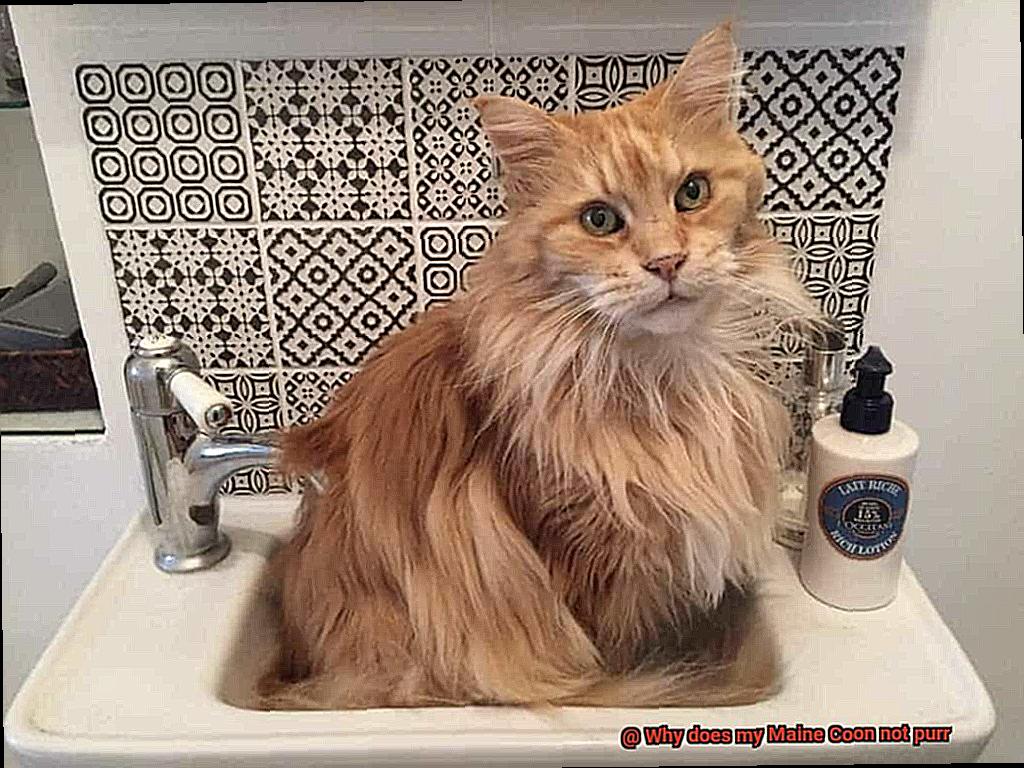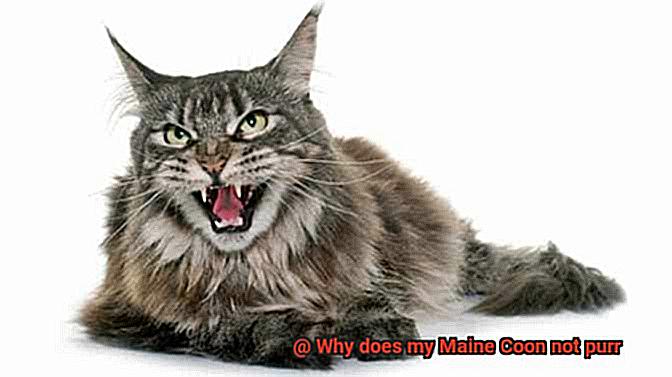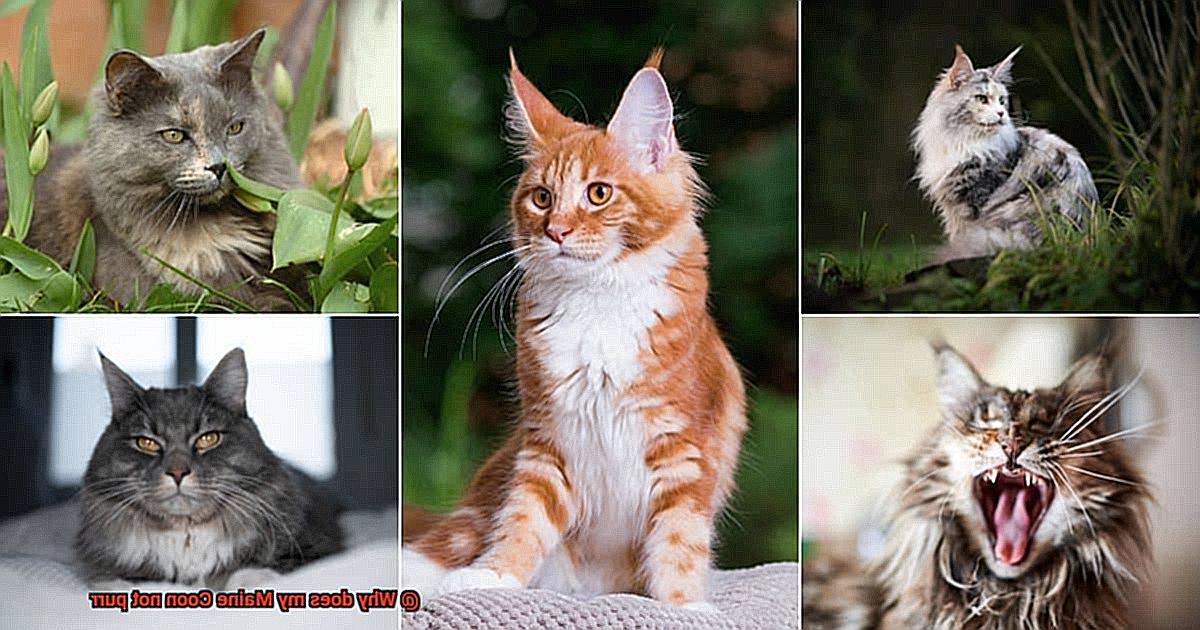Do you ever find yourself petting your Maine Coon, waiting for that satisfying purr to emanate from their chest, only to be met with silence? It’s not uncommon for cat owners to expect their feline friends to purr when they’re content and happy. But what happens when your Maine Coon doesn’t follow suit? Don’t fret just yet – there are plenty of reasons why your cat might not purr.
In this blog post, we’ll take a closer look at the science behind purring and why some cats don’t make this soothing sound. We’ll explore the potential factors that could be contributing to your Maine Coon’s lack of purring, from physiological differences to personal preferences. By delving deeper into this topic, you might even gain a better understanding of your cat’s behavior and personality.
So why does your Maine Coon not purr? Is it something to worry about? Let’s uncover the mysteries together and learn more about our furry companions. Whether you’re a seasoned cat owner or a new one, there’s always something new to discover about these fascinating creatures. So join us on this journey as we explore the reasons behind your Maine Coon’s silent demeanor.
What is Purring?
It’s purring, a unique feature of the feline species that occurs when cats vibrate their vocal cords while breathing in and out. While often associated with happiness and contentment, purring can also happen for other reasons, such as when a cat is in pain or feeling anxious.
But did you know that the frequency of a cat’s purr can have therapeutic effects on humans? Studies have shown that it can reduce stress levels and promote relaxation. So not only does purring benefit cats, but it also benefits us.
If you’re a Maine Coon owner, you may have noticed that your furry friend doesn’t purr as much as other cats. There are several potential reasons for this, from a lack of strong purring instinct to physical issues like respiratory problems or injuries. Stress and anxiety can also play a role in your Maine Coon’s lack of purring, especially if they’ve undergone changes in their environment.
If you’re concerned about your Maine Coon’s lack of purring, it’s always best to consult with your veterinarian to rule out any underlying health issues. While some cats may simply be quieter than others, ensuring that your furry friend is happy and healthy is crucial.
Reasons Maine Coons Don’t Purr
Purring is a comforting sound that indicates a cat’s contentment and relaxation. When Maine Coons don’t purr, it can be concerning for their owners. In this blog post, we will explore the top five reasons why some Maine Coons don’t purr, and what you can do about it.
Lack of Instinct
Although this can be concerning, don’t fret just yet – it could simply be due to a lack of instinct.
Purring is a natural behavior for cats that typically indicates contentment and relaxation. However, some cats may not have a strong instinct to purr for various reasons. For example, if a kitten is separated from its mother too early, they may not learn how to purr properly. Additionally, if your cat has had negative experiences with humans in the past, they may not feel comfortable enough to purr around them.
Nevertheless, every cat has its own unique personality, just like humans do. Some Maine Coons may simply be less vocal than others, which is entirely normal. Therefore, if your cat doesn’t purr as much as you’d like, it could be down to their individuality.
If your Maine Coon appears healthy and happy otherwise, there’s likely no need for concern. However, if you’re worried about your cat’s lack of purring or suspect there may be an underlying health issue, it’s always best to consult with your veterinarian.
Physical Issues
Maine Coon cats are renowned for their deep and vibrant purrs, which can be both heard and felt. However, if your furry friend is not purring, it may be a cause for concern. In some cases, the absence of purring can be attributed to physical issues.
Dental problems are a common physical issue that can affect a Maine Coon’s ability to purr. If your cat is experiencing tooth or gum pain, it may avoid purring as this can exacerbate the discomfort. Gum disease and tooth decay can also lead to a lack of purring.
Respiratory problems can also prevent a Maine Coon from producing its signature rumble. Breathing difficulties caused by asthma or other respiratory issues can make it challenging for the coordination required between the diaphragm and muscles in the throat and chest to produce a purr.

Additionally, neurological issues such as nerve damage that controls the vocal cords may lead to a lack of purring. This can happen due to injury or illness and may require medical intervention.

Nevertheless, it’s crucial to note that not all Maine Coons will purr, even if they are healthy. Some cats have different ways of expressing themselves, while others don’t have a strong urge to purr. However, if your furry pal suddenly stops purring or has never purred before, it’s important to consult with your veterinarian to rule out any underlying health issues.
Stress and Anxiety
Like all cats, Maine Coons can experience stress and anxiety, which can cause them to become withdrawn, irritable, and even stop purring altogether. But fear not. By understanding the triggers of stress and anxiety in your Maine Coon, you can take steps to help them feel more comfortable and at ease.
Creating a calm and stable environment is one of the best ways to reduce stress and anxiety in Maine Coons. This means providing plenty of hiding places like cat trees or boxes where they can retreat when they need to feel safe. Make sure they have access to plenty of food, water, and litter boxes, as well as plenty of toys and playtime to help them burn off excess energy.
Another effective way to reduce stress and anxiety in Maine Coons is by using a pheromone diffuser such as Feliway. This diffuser mimics natural pheromones that cats produce when they feel safe and secure. It can help your Maine Coon feel more relaxed and at ease in their environment. Imagine the scent of fresh flowers on a spring day – that’s how Feliway makes your cat feel.
Playing calming music or white noise can also be helpful during times of high stress, such as during thunderstorms or fireworks displays. Think of it like creating a peaceful oasis for your Maine Coon – a place where they can relax and let go of their anxieties.
If your Maine Coon is exhibiting signs of stress or anxiety, such as excessive grooming or hiding, it’s important to take them to the vet for a checkup. Your vet may recommend medication or other treatments to help manage your cat’s stress levels and improve their overall well-being. It’s always better to be safe than sorry.
How to Help Your Maine Coon Purr Again
Here are some ways to explore how to help your Maine Coon purr again.
Identifying the Root Cause
The first step in helping your Maine Coon start purring again is to determine the root cause. A lack of purring can be due to physical, emotional, or environmental factors. Once you have identified the cause, you can take appropriate steps to address it.
Pain and Discomfort
If your cat is experiencing pain or discomfort, they may not feel like purring. Dental problems, arthritis, and injuries are common causes of pain in cats. In such cases, it’s essential to take your cat to the vet for a check-up and treatment. By addressing their physical issues, you can help them feel better and more inclined to purr.
Stress and Anxiety
Stress and anxiety can also prevent your Maine Coon from purring. If your cat has recently moved to a new home or experienced changes in their routine, they may be feeling anxious and unable to relax enough to purr. You can provide them with a comfortable and safe space where they can feel calm and secure. Playing soothing music or using pheromone diffusers can also help reduce their stress levels.
Medical Issues
Respiratory issues such as asthma or allergies can also make it difficult for a Maine Coon to purr. If you notice any changes in your cat’s breathing, it’s crucial to seek veterinary care right away. Your vet may prescribe medication or treatment that can help alleviate any respiratory issues that are preventing them from purring.
Patience and Understanding
Finally, it’s important to remember that every Maine Coon has their own unique personality and preferences. Some cats simply don’t purr as often or as loudly as others. With patience and understanding, spending quality time with your cat, providing them with plenty of affection and attention, and offering them their favorite treats and toys can encourage them to start purring again. Remember, it may take time for your cat to feel comfortable enough to start purring again, so be patient and keep trying.

Signs Your Maine Coon Is Content and Happy
Here are some telltale signs to look out for.
Firstly, pay close attention to your cat’s body language. A relaxed and comfortable Maine Coon will have a loose body posture, with their ears facing forward or slightly to the side, and their tail in a neutral position. They should also be playful and active, enjoying toys, balls, and even engaging in some fun hide-and-seek with their owners.
Maine Coons are known for their love of affection, so if your cat seeks out cuddles and strokes from you, it’s a great sign they’re content and happy. Watch out for your cat rubbing against your legs or purring while sitting on your lap.
A healthy appetite is another sign of a happy Maine Coon. Your cat should eagerly eat their food and show interest in mealtimes. If their appetite changes suddenly or they stop eating altogether, it could be a sign of an underlying health issue.
Lastly, keep an eye on your Maine Coon’s sleeping patterns. A happy cat will sleep soundly for long periods of time, either curled up in a cozy spot or stretched out on a sunny windowsill. They will look peaceful and content.
87sQ5AF6wSM” >
Potential Health Issues That Could Cause Lack of Purring

One of the ways they express their love is through their gentle purrs. However, if your Maine Coon isn’t purring as much as they normally do, it could be a sign of an underlying health issue.
Here are some potential health issues that could be causing a lack of purring in your Maine Coon:
Dental Problems
Did you know that dental issues such as gum disease, tooth decay or tooth abscesses can cause pain and discomfort? This pain can rob your Maine Coon of their desire to purr. If you notice that your furry friend is not purring as usual, it’s important to take them to the vet for a dental checkup.
Respiratory Issues
Your Maine Coon may also experience respiratory issues such as asthma or bronchitis. These conditions make it difficult for your cat to breathe properly, which can cause a decrease in purring. Other symptoms to look out for include coughing, wheezing, or difficulty breathing.
Neurological Issues
Neurological issues such as nerve damage or spinal cord injuries can affect your Maine Coon’s ability to purr. If you notice that your cat isn’t purring and has other symptoms such as difficulty walking or coordination issues, it’s important to take them to the vet for a neurological exam.
Stress or Anxiety
Lastly, stress or anxiety can also lead to a decrease in purring. If your Maine Coon is not comfortable in their environment or is experiencing stress due to changes in their routine, they may not purr as much as they usually do.
It’s essential to remember that these are just some potential health issues that could be causing your Maine Coon’s lack of purring. It’s always best to take your cat to the vet for a thorough examination if you notice any changes in their behavior or health. By addressing any underlying health issues, you can help your Maine Coon feel comfortable and happy, and get them purring again in no time.
Also Read: Why Do Maine Coons Make Weird Noises?
Conclusion
In conclusion, the purring sound of a cat is a unique and fascinating feature that has been studied by scientists for years. While it’s commonly associated with feelings of happiness and contentment, cats can also purr when they’re in pain or anxious. Maine Coon cats are known for their deep and resonant purrs, but some may not exhibit this behavior as much as others.
There are several potential reasons why your Maine Coon may not be purring, ranging from a lack of strong purring instincts to physical issues like respiratory problems or injuries. Stress and anxiety can also play a role in your cat’s silence, especially if they’ve experienced changes in their environment recently. However, it’s important to remember that not all Maine Coons will purr even if they’re healthy.
If you’re worried about your Maine Coon’s lack of purring or suspect there may be an underlying health issue, it’s always best to consult with your veterinarian. By identifying the root cause and addressing any underlying health issues, you can help your furry friend feel comfortable and happy again. Keep an eye out for signs of contentment and happiness in your cat through their body language, appetite, affection-seeking behavior, playful nature, and peaceful sleeping patterns.
So don’t worry if your Maine Coon isn’t a big purrer – every cat is unique. As long as they’re healthy and exhibiting other signs of happiness, you have nothing to worry about.







